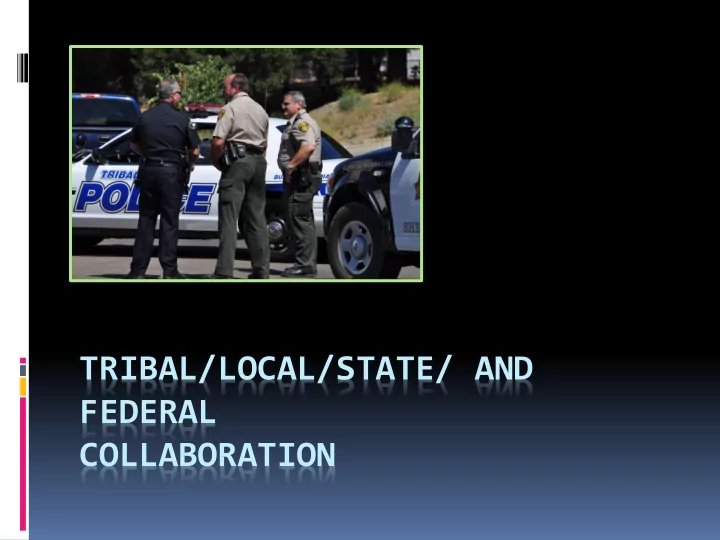

TRIBAL/LOCAL/STATE/ AND FEDERAL COLLABORATION
Historical Roadblocks Misunderstanding of Public Law 280 Large number of Reservations and Rancherias non-Indian populations outnumbering Indian populations 10-1 due to economic development on many Reservations
More Roadblocks Lack of funding for tribal justice systems
Wholesale Attempt with Tribal/County/State Collaboration 2000 with CA Senate Bill 911 Bill would have given CA Peace Officer Status to qualified tribal police officers State AG hosted negotiation meetings between tribal leadership and Sheriff’s Largest areas of contention: hiring & training requirements, CLETS access, and liability (tort claims) Unable to work out issues surrounding liability…bill died
What’s Next? After reviewing crime data it was determined that much of our crime fell concurrently within both federal and state law, from drugs and thefts to trespassing and poaching Entered into a deputation agreement with the BIA’s Office of Justice Services for issuance of Special Law Enforcement Commissions to our police officers
Collaboration for Prosecution US Attorney’s Office – major applicable federal offenses Central Violations Bureau (US District Court) – petty federal offenses District Attorney's Office – state offenses Tribal Court – traffic offenses and regulatory
Collaboration with County and Other Local Agencies County-wide law enforcement interoperable radio communications system: rework of policy to allow access Impetus: off-reservation pursuit Information sharing Access to law enforcement databases (NCIC, NLETS, and CLETS)
Collaboration with Federal/State Agencies for Law Enforcement Database Access No state access because state law doesn’t define tribal police departments as “public agencies” 2010 work around pilot program by US DOJ for access into NCIC and NLETS CA blocked access for NLETS information to tribal agencies initially CA Attorney General’s Office, BIA Office of Justice Services and tribes collaborate for resolve
Collaboration with Federal/State Agencies (continued) Current effort underway with BIA’s Office of Justice Services to facilitate access into CA state systems for tribal police officers holding BIA special law enforcement commissions Hot files Gun files Parole status Local misdemeanor warrant information Etc…
A must for good faith collaboration Establishing an identity based off of department's capabilities Holding to strict hiring and training standards Operational transparency not just with the community you serve, but just importantly with your local, state, and federal partners.
Contact Information Bill Denke Chief of Police, Sycuan Tribal Police Dept. 619.445.8710 bdenke@sycuan-nsn.gov
Recommend
More recommend